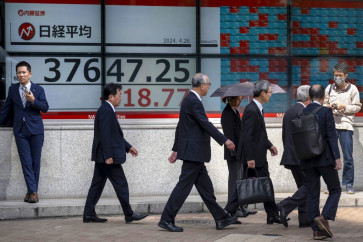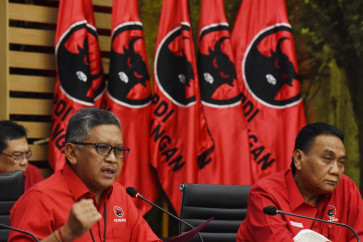PLN books Rp 12.2 trillion net loss as COVID-19 proves double whammy
Change Size
 PLN expanded its electricity network by 11.5 percent to 59,817 circuit kilometers last year. (PLN/PLN)
PLN expanded its electricity network by 11.5 percent to 59,817 circuit kilometers last year. (PLN/PLN)
S
tate-owned electricity giant PLN has booked trillions of rupiah in losses so far this year due to lower energy demand and a weak rupiah exchange rate during the COVID-19 outbreak.
PLN posted a Rp 12.2 trillion (US$872.8 million) loss in the January-September period, which compares to a profit of Rp 10.8 trillion achieved over the same period last year, the company’s latest financial statement shows.
The company’s revenue rose 1.4 percent year-on-year (yoy) to Rp 212.2 trillion in the first nine months of this year from Rp 209.3 trillion last year. Meanwhile, expenses declined by 3.5 percent yoy to Rp 223.8 trillion from Rp 231.9 trillion in 2019, even though the figure still exceeded its income.
PLN spokesman Agung Murdifi said on Tuesday that the company’s electricity sales volume grew 0.6 percent yoy to 181,638 gigawatt hours (GWh) in the third quarter. The growth came after PLN expanded its customer base by 4.6 percent yoy to 77.9 million users as of Sept 30.
“Higher electricity sales in the residential sector, agricultural industry and small and medium enterprises [SME] helped push positive sales growth,” he said.
The growth in the agriculture sector and SME industries comes amid lower demand for electricity in many other sectors, following the imposition of large-scale social restrictions (PSBB) to contain the coronavirus.
Read also: Agriculture resilient to pandemic’s impact
PLN’s profit plunge was also exacerbated by foreign exchange losses amounting to Rp22.9 trillion on the first nine months of the year, in contrast to last year’s Rp 4.4 trillion profit, as the Indonesian rupiah weakened against the US dollar. PLN mainly uses dollar funds to pay fossil fuel suppliers and independent power producers (IPPs).
Despite a significant recovery from its low of Rp 16,575 hit in March, the rupiah remained weak in the first nine months of the year, hovering just above Rp 14,000 against the greenback on average.
“Amid economic uncertainty due to the pandemic, the company continues to execute efficiency measures,” added Agung.
To reduce cost, PLN has halved employee incentive spending and slashed IPP power purchases to a minimum, as it did with several hydropower plants in North Sumatra.
The COVID-19 pandemic has added to the financial strain of a company that was already cash-strapped before the global crisis emerged, as the government has ordered the electricity distribution monopolist to lower electricity prices, offer discounts to customers and waive subscription fees amid people’s declining purchasing power due to the health crisis.
Analysts have said that a cash-strapped PLN risked, in the short-term, derailing Indonesia’s green energy plans and, in the long-term, burdening taxpayers as the government uses state funds to balance the company’s finances.
Read also: COVID-19 hits already struggling power firm
“Due to COVID-19 and the global energy downturn, PLN’s chances of a material price increase and more robust cash flow are very low for at least another 18-36 months,” said Melissa Brown of the Institute for Energy Economics and Financial Analysis (IEEFA) on Oct 23.
According to Brown’s latest report, PLN would need to increase prices by 30 percent to improve its cash flow, a move “that would surely test public approval.”









